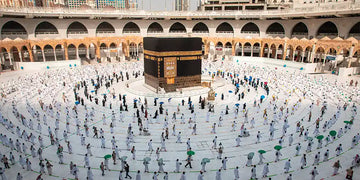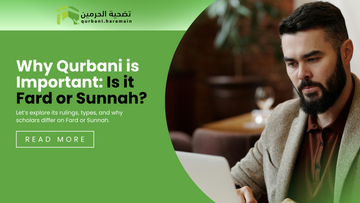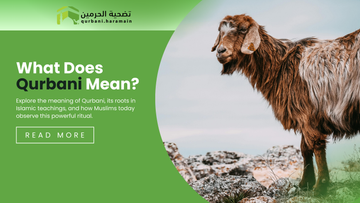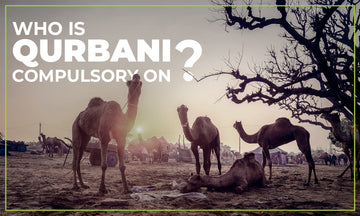What is Dhul Hijjah?
The First Ten days of Dhul Hijjah, the 12th and final month of the Islamic calendar, are considered the best ten days of the year for Muslims, even more so than the last ten days of Ramadan. Indeed, Sunan Ibn Majah states that ‘there are no days in which virtuous acts are more precious to Allah than these ten days.'
On the Day of Arafah, the 9th day of Dhul Hijjah 632, Prophet Muhammad (ﷺ) delivered his final sermon on Mount Arafat, and it was on this day that Allah (SWT) completed His favor and perfected the religion of Islam. Hajj, one of the five pillars of Islam, is performed by millions of Muslims worldwide during this time.
Although we may not be able to perform Hajj this year, there are still plenty of ways to reap the rewards of these blessed ten days by engaging in voluntary fasting, worship, charitable giving, and offering Qurbani.
These ten days offer another opportunity to accumulate tremendous rewards, have our iniquities forgiven, and reach holiness, Insha Allah.
In a month of risen spirituality, we witness two grand occasions – all in affection to Allah (SWT). In addition to Hajj, Dhul Hijjah also marks Eid-Al-Adha, one of the holiest days on the Islamic calendar. On this day, every one of us, who is capable, offers Qurbani, just as Prophet Ibrahim (AS) did in dedication to Allah (SWT) and to support vulnerable communities in need.
WHY IS DHUL HIJJAH IMPORTANT?
Within Islam, several verses and ahadith highlight the Benefits of Dhul Hijjah and its first ten days as the holiest days of the year.
In the Quran, Allah (SWT) promises an assurance by these first ten days by stating:
'By the morning and by the ten-night.' (Al-Fajr 89:1-2)
When Allah (SWT), the creator of the universe and everything in it, swears an oath by something, it shows how important and beneficial they are to us as His creations.
Correspondingly, on the 9th day of Dhul Hijjah, the Day of Arafah, the Prophet Muhammad (SAW) acquired this verse:
'This day I have perfected for you your religion and concluded My blessing upon you and have authorized for you Islam as religion.' (Quran 5:3)
The Day of Arafah is regarded as the magnific day of the year, just as Laylatul Qadr is regarded as the magnific night during the blessed month of Ramadan. Since Allah (SWT) perfected His religion, fulfilled His promises to His beloved Prophet Muhammad (PBUH), and approved Islam as a way of life on this Day of Arafah.
In favor, ahadith that indicate how sanctified the first ten days of Dhul Hijjah are include:
'The most prominent basis for the ten days of Dhul Hijjah being outstanding in distinction is due to the assembly of the grandest deeds of glorification in this period, Salawat (prayers), Siyam (fasting), Sadaqah (charity) and the Hajj (pilgrimage). In no other terms do these wonderful acts unite.' (Fath al-Bari).
As a result, many Muslims spend the first ten days of Dhul Hijjah focusing on Allah (SWT). As a period past Ramadan, whenever we have the best available door to boost our gifts and rewards from Allah (SWT), we ought to capitalize on these best ten days by hoisting our great deeds and demonstrations of love.
WHAT SHOULD WE DO DURING THE FIRST TEN DAYS OF DHUL-HIJJAH?
Generally, all good deeds are rewarded during the blessed first 10 days of Dhul Hijjah 2023. It is especially true on the 9th day of Dhul Hijjah, as 'There is no greater day of release from the fire than the day of Arafah.' (Muslim)
Praying, reading the Quran, making Dua (supplication), asking Allah for forgiveness (Istighfar), repenting, giving to charity and being kind to our families, and other voluntary (nafl) righteous acts of worship are examples of good deeds. On the other hand, during these best ten days, we are encouraged to perform certain good deeds that are mentioned in the Quran and Sunnah.
HAJJ
The period of Dhul Hijjah is otherwise called 'The Month of the Pilgrimage.' On the eighth, ninth, and tenth day of the month, Muslims from all over the world in Makkah perform Hajj, the fifth pillar of Islam, so they will have all their past sins excused upon finishing.
It is because performing the Hajj is regarded as one of the most beneficial acts during the first ten days of Dhul Hijjah. Similarly, the Prophet Muhammad (SAW) said to those who do the Hajj with sincerity: 'An admitted Hajj gets no less a reward than Jannat (paradise).' (Ibn Majah)
FASTING
Fasting during Dhul Hijjah is significantly energized during the initial nine days. It is particularly valid for the Day of Arafah, as the Prophet Muhammad (SAW) said: 'The minor sins of two years can be forgiven by fasting on Arafah Day.' (Muslims).
DHIKR
Another good deed that God especially values during the first ten days of Dhul-Hijjah is dhikr or verbal remembrance of Allah (SWT).
In the Quran: 'And mention the name of Allah on the appointed days.' (Al-Hajj 12:28).
Also, the Prophet Muhammad (SAW) advised Muslims to recite a lot of Tasbeeh (SubhanAllah), Tahmeed (Alhamdulillah), and Takbeer (Allahu-Akbar) during this time.
He (SAW) said: 'Recite a lot of tahleel, takbeer, and tahmeed during these ten days because there are no greater days before Allah in which good deeds are more beloved to Him.' (Ahmad)
RECITE QURAN
Reading the Quran is one of the best deeds of adoration we can act to attract nearer to Allah and strive for his delight. According to the Prophet (saw), Whoever reads a letter from Quran will be rewarded. Those rewards will be multiplied tenfold. I am not commenting that Alif, Laam, Meem is a letter, rather, I am commenting that Alif is a letter, laam is a letter, and Meem is a letter.' [Tirmidhi]
SubhanAllah, assume the bonuses you will achieve from reciting each letter during these holy days when Allah has promised to breed your premium rewards!
REMEMBER LOVED ONES
During our own Hajj or when we perform a Hajj specifically for a loved one who has passed away, many of us will attempt to make dua for them so that Allah will forgive them and have mercy on them on the Day of Judgment.
If you are incapable to do Hajj for a loved one, you can still praise them by offering Sadaqah Jariyah in their name on these holy days. Prophet Muhammad (saw) stated, 'After a person dies, his deeds cease except for three: Sadaqah Jariyah, knowledge gained from it, and a virtuous child praying for him.' [Muslim]
Our beloved Prophet (saw) said that the best Sadaqah is to give water. By building a well for the sake of your cherished one, you will gift a wellspring of life to an entire local area and expand your adored one's record of good deeds for the Day of Judgment.
SACRIFICE
The tenth day of Dhul-Hijjah is Eid Al-Adha when we conduct Qurban. This custom of Eid Al-Adha celebrates the commitment of Prophet Ibrahim (AS) to Allah (SWT). God intervened and sent a ram to sacrifice in place of Ismail (AS) because he was willing to give up his son for Allah (SWT).
As a result, in honor of this significant act of worship, Muslims around the world slaughter an animal, a goat, sheep, cow, or camel on the festival of the sacrifice known as Eid Al-Adha. Following the penance, the meat is partitioned, in which something like 33% of the Qurbani meat should go to poor people or the helpless.
We hope this blessed month will be a time of great joy, reflection, and blessings for all as the first ten days of Dhul Hijjah approach. Insha Allah, may we make the most of the rewards Allah (SWT)!
A central stake of the Muslim faith is offering charity and helping those in need. Zakat and Sadaqah are based on supporting others, although they have dissimilarities. Zakat is one of the Five Pillars of Islam and is a mandatory annual expenditure made to cleanse all wealth carried above the Nisab threshold value. Sadaqah is not compulsory; it is a kind gesture to support others.
What is Sadaqah?
The literal translation is ‘righteousness.' However, in the modern-day context, it has arrived to indicate ‘volunteer charity.' Sadaqah is a virtuous behavior that demonstrates solemnity of faith.
It tends to be everything from a thoughtful gesture to a money-related gift. Sadaqa, for instance, can be a freely given donation. It could be assisting a person in need, smiling, or even removing a threat from your path. Sadaqah also includes Fidya, Aqiqah, and Kaffarah.
Some examples of Sadaqa include:
- Granting money to someone in need
- Making meals for others
- Teaching Quran
- Smiling at others
- Watering a plant
- Taking care of an animal
- Withdrawing something harmful from the path
- Care about family and children.
What is Zakat?
Zakat is a required foundation for each grown-up Muslim. We are instructed to give it yearly, while not performing it is a significant sin. The poor benefit from the zakat collection, which means 'to purify.'




